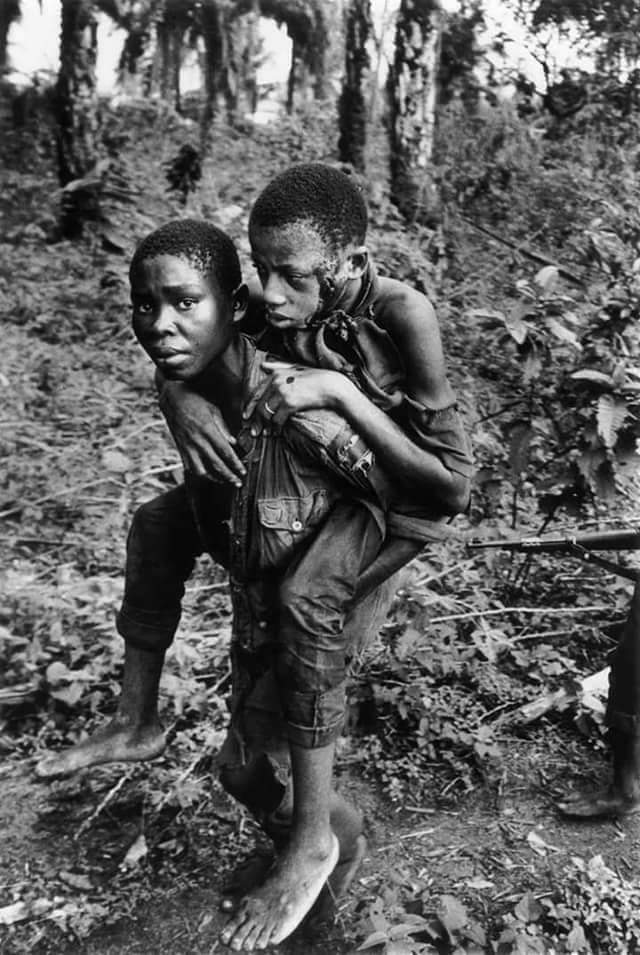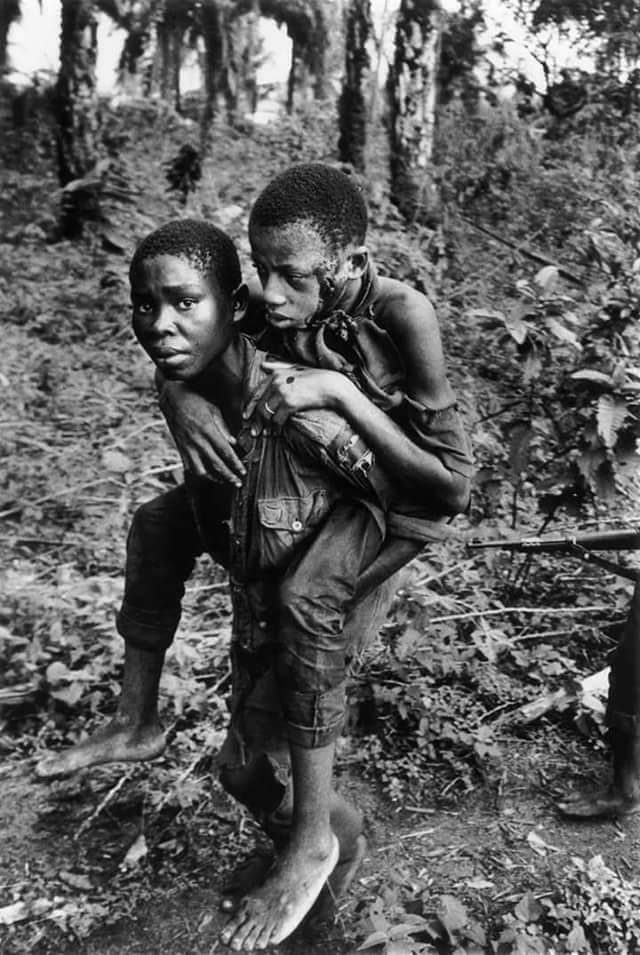Global Issues
Ugulu: The Biafran Child Soldier -By J. Ezike

In that early morning, there was a loud, horrendous cry of “Hapu m ka m nwuo!” a young Biafran woman on a wrinkled stretcher wept over the hails of shrapnel that ravaged the four walls of Ochanja Market Square in Onitsha. She sprawled on her mutilating belly with arms mangled, a face that scored the scar of a war torch, a mouth dyed with mud, eyes that burnt like dirty crimson, teeth that gnashed an expression of torture, hot sweat reeking of burnt flesh, hemorrhaging from the drumfire shelling that preceded her dismembered limbs and the grey palls of death that blanketed her unendurable agony. Carted brusquely away by two young lads, Ugulu and Chimobi, who galloped on barefoot from the gutted Cathedral charred in war flames and was steered forward to a Volvo 485 pickup truck stuffed full of half-dead survivors. More lads followed, clearing corpses, a headlong dash through the blistering heat of the Market Square fading in the flames that ascended its height against the clouds.
It was rainy season and the earth was mushy red. The waters from the clouds wrestled with the fire. The more it poured in torrents the greater the flames grew. The Biafran fire service had set out in response, but had arrived twenty minutes late. The rain had straggled on the speed of the tires, constraining the hefty Mercedes fire engine to muscle its way across the steep hillside and the labyrinths of mud-caked rocks. Father Roy, an Irish cleric and senior parish priest of St. Mary’s Cathedral and some Red Cross nurses had towed closely behind the fire service. The tires of his Lemon beetle jerked riotously on the wet gallops, screeching towards the gory scene on top speed, spattering murky waters on the shrubs that flanked both sides of the crooked road. The nurses were Irish and worked at the civilian fields and refugee camps in Onitsha. They had lost all freedom of when to sleep and had spent their lives playing a high-risk role of the humanitarian. They had rounded the Market Square inflicted by war flames, searching for survivors and administering emergency treatments…

Earlier ago, a Russian MiG-17 aircraft piloted by the Nigerian military had riddled the squat commercial buildings with incendiary missiles. The Biafran civilian population was taken unawares by the sudden air attack that marked the first series of the First Offensive. Two miles away from the Market Square, Ugulu and Chimobi had seen the aircraft violently charging from the West point of the River Niger Bridge. Ugulu who was barely fourteen years of age and whose date of birth coincided with that of his ally in the course of the war, were hurled into a fated destiny impelled by an enormous loss that made them both orphans on the same day. Four weeks into the Civil War, a British fighter-bomber piloted by the Nigerian military had attacked Nnewi. The civilians were the obvious target and were tottered by massive explosions that flogged palm trees to the ground. The missiles oppressed the land with a prideful sense of disdain, as feet lurched at full tilt, docking into shallow trough and dense forest. The traffic had been littered with mauled flesh of civilians, cars seething with violent indigo. The Biafran population whose death-defying bravery and audacious chivalry lacked the fang power and stood helpless against the foreign belligerence that flattened buildings to reefs and sandbars, took to their heels and some whacked by shrapnel as the city boiled on the fury of bombs.
Ugulu and Chimobi weren’t at home that day. They had both gone swimming at Urasi River, when they heard an explosion from distances away. Both of their parents were in a Town’s Hall Meeting in Uli. The fighter-bomber had plowed its offensive on the route that oversaw regions within Uli, Oguta and Ihiala. The Town’s Hall wasn’t spared in that fiery ball of red that ate the targeted regions. The young lads had left the riverine road with a crowd of people that flocked out of the watercourse. They had halted on a traffic that became a shallow grave. And before their eyes the city looked more terrifying than Hell. And they wandered tearfully about in search of their loved ones until dusk befell the wounded land. They couldn’t make it to the Town’s Hall. The mobility of the city had been crippled and even when they had returned to their various homes, they found them in despairing wretched conditions, charred, deserted and transfixed in limbo. It wasn’t until the next day that the fear for the worse had turned savage, battering every pulse of hope when the surviving witnesses had journeyed from the cradle of tragedy to inform them of their parents’ death…
For Ugulu and Chimobi, that page of their lives altered their stories. It gave them a bleak glimpse of war than they had had before the declaration of Biafra Independence. They learnt in no distant time to grow into alien diets and to adapt to the long struggle that had consumed millions of their people. They learnt to push their fortitude forward, to have a greater chance of survival than a rat stowing away in their dugouts, to become a sacrifice not to be laughed at. Ugulu was not afraid in the realistic sense, as he would have if he had never been tied to a destiny that demeaned his bloodline, his people to smiling corpses. Even at the age of fifteen, Ugulu wasn’t squeamish about killing the Nigerian soldiers. He had waited for that day, biding his time, knowing that his moment would arrive…
In 1968, the war was worth at least two million deaths. At that time, Ugulu and Chimobi had joined a caravan of refugees on a long exodus through the pebbled red roads that ran over creeks and forests. They were heading for a camp in Umuahia. As the journey grew stale, one by one, the people died swiftly on their failing strengths. Their agonies knocked them down with the impact of bullets, draining their histories in a black hole of lies. Only the watchful golden eye of the sun bore witness to their pressing wills of survival that was quite new to the senses of humanity. For Ugulu, in the many air raids he had survived, none was more crushing than the episode that aimed straight at Chimobi’s destiny.
Two days into the journey, they heard the grave clucking sound of an Egyptian fighter jet roaring above the canopies of the serried ranks of palm trees. It was late in the night. The fighter jet chugged with a bang as the crowd grew very still. It wasn’t until the bullets started to rain down that their splintered feet remembered how to run again. Those on wheel chairs and crutches straggled behind; mothers clutched on their crawling ones, fathers guiding the throng to safety as the bullets poured down heavily. Those struck by the terrible shells were left aside, forgotten almost at once. Ugulu had been crammed in chaos. His feet volleyed through the murky hill like the bolt of electricity. Every cell of his being, swearing not to die that night. Just like his name – Ugulu, he became the harmattan in that red night.
It was said that when he was born, his grandfather Okute, a powerful witchdoctor of Okija had told his father a catholic catechist, that the new born child was different. Okute had revealed an ancient secret of the harmattan. He said:
“He that is born in the Harmattan, wears the coat of the graveyard
His soul is pale.
And his journey is one with Death.
He shall be like fog in the eyes of Evil.”
Ugulu proved it as age came calling. He proved it that night. As thousands fell all around him, he never lost his steam, not until he heard a loud piercing cry from behind and a familiar voice chanting his name. Amidst the hails of bullets, Ugulu braked down on his speed. He turned, the night reeling blood in his eyes, adrenaline shooting through his pulse as he captured a piteous image of Chimobi on the red-caked soil, in the pool of his blood. A stray bullet had severed his universe, rendering his right leg bootless. Ugulu in grave shock and with a sorrow that paralyzed his legend ran towards Chimobi and hauled his fallen body on his warrior shoulder. Ugulu was running now. His eyes bleeding tears. He wasn’t looking back. The only place on his mind was forward. Umuahia was thirty minutes away. With the last remnant of strength in his legs, he ran with the surviving hordes, dodging the bullets and the bomb drops that shook the red earth beneath their feet…
At last, after what seemed like an unending torture, Ugulu with sagged scraggy bones, shrunken, and immensely shattered found the camp with the rest of the battered crowd. There were Irish and Biafran nurses on ground to assist with the fatally injured. Chimobi and hundreds of others were crammed into a squat edifice that functioned as a war infirmary. The atmosphere reeked of fear, horror and death. Chimobi was breathing rhythmically with quick clattering pants. His eyes were bulged. His mouth was wide open. Grave sweats trickling down his forehead. Flies were strewn around his mangled feet mauled by bullet. The pain collapsing upon his world as he fought to keep the violent death away from his breath. Ugulu stood beside him in tearful silence. An enormous grief settled upon him as he watched his friend diminishing in the wrath of blistering pain. Thick blood gushed out of the ruptured leg like dark scarlet, making mockery of the white bandage that vainly curbed the flow. As he sprawled there, lying powerless and not able to finish the war, Chimobi in that great agony, flecked a soothing smile at Ugulu. As if to console his friend, as if to help him find solace in that brand of manful cheerfulness. Even though he was dying, very slowly but surely, Chimobi found joy in the death he had won as trophy. In that difficult breathing, he sang the song of survival that became the soul anthem of the Biafran War. With a dying wistful voice, he sang;
“We are Biafrans, fighting for our freedom
In the name of Jesus
We shall conquer.”
Ugulu joined in chorusing the song, as they both cried and held hands. And then quietly Chimobi slept to wake no more. He was gone. Ugulu roared with a voice that seemed to shake the foundation of the building. That was the loss that changed him forever…
One year later, at just sixteen years of age Ugulu had joined the Biafran army’s 17th division led by Colonel Max, a German Soldier of Fortune. It was in 1969 at a football field in Owerri. At that time, Ugulu and millions of refugees had fled Umuahia and flooded into the heart of Igbo land. Ugulu had volunteered to defend his people. There, in Owerri, he committed himself to doing what his heart and mind had agreed upon. He had clutched on a rifle-sized stick with many other Biafran Child Soldiers, chanting war songs, marching on the dust to the battle field. For Ugulu, it wasn’t Ojukwu he had sworn to fight for. No. Ojukwu was too small. He was going to fight for something bigger, something greater him. He was going to fight for survival. He was going to fight for justice. He was going to fight for freedom. He was going to fight for Biafra. And straight ahead was the local enemy with foreign deaths in his pouch. For Ugulu, he had lost everything to the cruel war. All he had left was Biafra, his guts and his Will for survival which had taken the form of the ocean’s current. It wasn’t going to flow on reverse. Ugulu had sworn that he would not surrender to the World’s hostility that bled his country dry and held his people hostage to the Devil. Not now. Not soon. Never…
This fictional story is the author’s tribute to the Biafran War Dead.



















